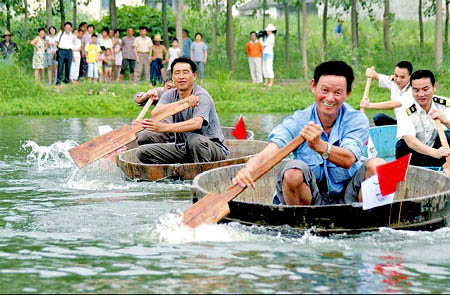If playing mahjong and chatting with friends was an Olympic event, Mao Junfu from the suburb of Bazhong in Sichuan province, might well have been a contender for Team China.
The 59-year-old told China Daily he usually spends most of his days pursuing the two activities, but since the Games began, he has been forced to take a break from both.

Men in Daqing, Zhejiang province, take part in their own version of Olympic rowing yesterday. [Xinhua]
|
The problem is that the owners of the nearby restaurants - the preferred venue for Mao and his friends to hone their skills in talking and tile placing - are too busy watching the Olympics to open for business.
"A lot of the competitions start at about 8 am and the restaurant owners are so keen to watch them, they just don't open up," Mao said.
He said he is not a sports fan, but likes seeing the Chinese athletes winning medals.
Mao is not the only person who has had to change his daily routine as a result of the nation's passion for watching the Olympics.
Zheng Wei, a shopkeeper from Guangzhou, said that as well as seeing fewer customers since the Games began, he has had to change his sleep patterns so he can keep up to date with all the events.
"I used to stay in bed until about noon, but I have had to change that to keep up with the schedule," he said.
Similarly, Susie Zhang, who works for a law firm in Shanghai, said she talked her boss into changing the time of the daily morning meeting so that she and her colleagues would not miss any important Olympic events.
In Beijing, a number of office workers have gone a step further and taken their annual leave so they can enjoy the Games with their families.
"It's been a great way for my family to bond," Gao Xiaohua, a 47-year-old mother of a 16-year-old son, said.
"Watching the Games with my son has brought back memories of the times we spent together when he was a child," she said.
Gao said the Games had also taught her son about the important things in life.
"The Olympics has taught him a lesson no textbook ever could: that when we set our minds to becoming a better country and society, every individual has to play their part," she said.
Jiang Ling, a university lecturer from Beijing, said the Olympics had also changed his way of thinking, albeit in a less profound way.
"Since the Games started, I have been unable to use my car, so I have been using the subway to get to work."
"I might even continue to use it after the Olympic Games is over," he said.
According to a recent survey by the Beijing Social Facts and Public Opinion Survey Center, 95 percent of the more than 2,000 Beijing residents polled said the traffic control measures introduced for the Olympics had been effective, and 58 percent said they should be retained after the Games.